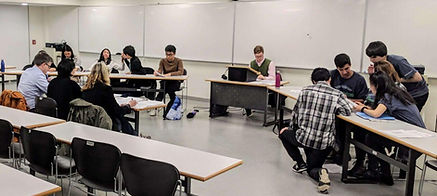
New to the Ethics Bowl?
Have you ever wanted to discuss issues that matter in a way that appreciates nuance and complexity?
You’ve come to the right place!
The Ethics Bowl is a space where discussion is used to untangle the nuanced topics. At an Ethics Bowl event, the goal is to share ideas, collaborate, and learn from disagreement.
Teams provide arguments in favour of their positions and receive input from other teams and a panel of judges. The judges score teams on clarity of argumentation, critical and constructive engagement, and their ability to appreciate views that differ from their own.
Sounds interesting? Let’s start your Ethics Bowl adventure!

Fast Facts
-
Eligibility: High-school (grades 9-12) or University Students
-
Team size: 3-7
-
Registration: Through ethicsbowlcanada.ca in September-December, fees vary by region.
-
Timeline: Qualifying competitions in January-February-March, National events in Late April (high school) and Late May (university)
How to Prepare
The Ethics Bowl is best experienced as a year-long activity. Here's how most teams prepare for the event.

September
-
Gather your team of 3-7: they can be classmates, or you can form an Ethics Bowl Club.
-
Register your team for your regional event.
-
Look over our cases archive and start training.

October
-
Cases for the year are released: start discussing the cases with your teammates, coming up with arguments, applying ethical frameworks, and thinking of objections.
-
Master the Ethics Bowl basics by watching our training videos.

November - January
-
Register for your regional event.
-
Schedule some Exhibition Matches to prepare for your regional event.

February - March
-
For high school teams, this is when most regionals take place.
-
If you qualify, compete at the provincial level.

April - May
-
Compete at the Canadian High School Ethics Bowl Nationals to be Canada’s Ethics Bowl champions!

During the Day
All Ethics Bowl events run as tournaments over one or two days. During the day, you will compete in 3, 4 or 5 matches, being paired with different teams throughout.
The event’s organizer will check you in, make some announcements, and soon you will be starting your first match! Each match takes about 60-75 minutes. You will have time to take a break between the matches.
Each match will feature a case pairing, usually in the order outlined in the year’s case set, and shown on the program. So you will know what cases will be discussed!
.jpg)

During the Match
Once you settle in and put your electronic devices and notes away, the moderator will introduce everyone in the room.
Then, the team to present the first case of the match (Team A) is randomly determined. If you aren’t presenting on a case, you will be commenting on the other team’s presentation.
After the presentation, Team B provides a commentary, then Team A responds, and takes questions from the judges.
Then, it's Team B's turn to present and Team A will comment!
.jpg)
Match Structure
First Case of the Match
Second Case of the Match
Learn More

What topics are discussed?
Ethics Bowl cases are designed to introduce complex topics and launch sophisticated educational conversations.

How are teams Scored?
Our rubric is designed to reward thinking, listening and responding thoughtfully, honestly, and constructively.

Everything else you might be wondering!
The rulebook has information about match rules, tournament structure, tiebreakers, and other procedures.
See it in Action
Watch this match from the 2024 National Finals, where Southern Kamloops Secondary and Kelvin High School teams discuss Progressive Fines and Sharing Public Space.
Advice from a Pro
Knowing where to start is difficult. But it doesn’t need to be. Learn how a former ethics bowl team captain led their team to victory.
Ethics Bowl Essentials
Whether you are participating, coaching, judging, or moderating, you can watch this video series to learn more about the Ethics Bowl and the different roles involved!
